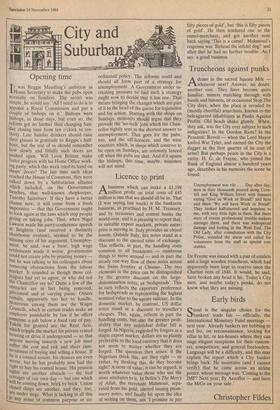City and
Opening time
It was Reggie Maudling's ambition as Home Secretary to make the pubs open normally on Sundays. The secret was simple, he would say: 'All I need to do is to appoint a Royal Commission and put a couple of bishops on it.' Bishops were bishops, in those days, but even so, the reform got no further than changing Sun- day closing time from ten o'clock to ten- thirty. Late Sunday drinkers should raise their glasses in gratitude to Reggie's half- hour, but the rest of us should remember how slowly and fitfully such doors are Pushed open. Will Leon Brittan make faster progress with his Home Office work- ing party, which this week tried its hand on Shops' doors? The last time such ideas reached the House of Commons, they were talked down by a Sabbatarian alliance Which included, on the Government benches, that well-known shopkeeper, Timothy Sainsbury. If they have a better chance now, it will come from a fresh imperative — that this Government ought to look again at the laws which stop people giving or taking jobs. That, when Nigel Lawson made his party-conference speech at Brighton (and received a distinctly chairborne ovation), seemed to be the missing core of his argument. Unemploy- rnent, he said, was a bane, high wage settlements made it worse, governments could not create jobs by printing money — but he was talking to his colleagues about removing obstructions from the labour market. It sounded as though those col- leagues had yet to agree, or why did not the Chancellor say so? Quite a few of the Obstacles are in fact being removed, Piecemeal and at varying paces. Others remain, apparently too hot to handle. Notorious among them are the Wages Councils, which in certain trades make an emPloyer punishable by law if he offers soMeone a job below a fixed rate of pay. I aken for granted are the Rent Acts, which cripple the market for private rented housing or drive it underground — so that anyone moving towards a new job must suffer the cost and risk and sheer cum- brousness of buying and selling a house. If he is a council tenant, his chances are even worse, but he has probably now had the right to buy his council house. His pension rights are another obstacle — the tied cottages of our own day — but one which will be coming down, brick by brick. Union closed shops are another, and they, too, are under siege. What is lacking in all this is any sense of common purpose or co- ordinated policy. The reforms could and should all form part of a strategy for unemployment. A Government under in- creasing pressure to find such a strategy ought now to decide that it has one. That means bringing the changes which are part of it to the head of the queue for legislation and for action. Starting with the shops on Sundays, ministers should argue that they provide the `no-tech' jobs which the Chan- cellor rightly sees as the shortest answer to unemployment. That goes for the pubs, too, and the off-licences, and the wine counters which, in shops which contrive to be open on Sundays, are solemnly fenced off when the pubs are shut. And if it upsets the bishops, this time, maybe, ministers will not mind.






















































 Previous page
Previous page